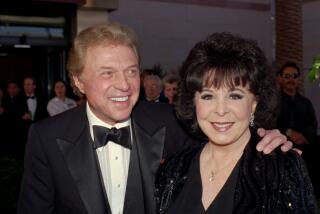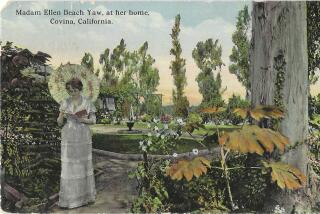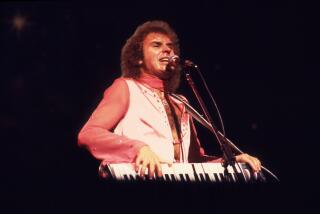Jay Livingston, 86; Co-Wrote ‘Silver Bells,’ Other Favorites
- Share via
Jay Livingston, who with songwriting partner Ray Evans wrote some of America’s most popular songs and shared Academy Awards for “Buttons and Bows,” “Mona Lisa” and “Que Sera, Sera,” has died. He was 86.
Livingston died Wednesday at Cedars-Sinai Medical Center of pneumonia, said publicist Frank Liberman.
For the record:
12:00 a.m. Nov. 7, 2001 FOR THE RECORD
Los Angeles Times Wednesday November 7, 2001 Home Edition Part A Part A Page 2 A2 Desk 2 inches; 40 words Type of Material: Correction
Livingston obituary--In an Oct. 18 obituary of songwriter Jay Livingston, Alan Livingston was incorrectly identified as the president of Capitol Records. He is a former president. In the same obituary, the names of 1940s hit-makers Eddy Howard and Freddy Martin were misspelled.
In a collaboration that began in the late 1930s, Livingston--who provided the melodies--and the surviving Evans--who wrote the lyrics--wrote 26 songs that sold more than a million records each. Recordings of their songs, including the holiday-season perennial “Silver Bells,” have sold almost 500 million copies.
Livingston and Evans wrote songs for at least 100 movies and earned seven Oscar nominations (“Tammy” and “Dear Heart” among them). Their credits include three Broadway productions and the themes for several TV series, including “Bonanza” and “Mr. Ed.”
The son of a shoe store owner, Livingston was born in McDonald, Pa., in 1915. He studied piano as a child, and during high school worked as a musician at parties and local nightspots.
While an undergraduate at the University of Pennsylvania in Philadelphia, he met Ray Evans, a student from Salamanca, N.Y., who joined him playing in bands on cruise ships during school vacations.
After Livingston earned a degree in journalism in 1937, the two young men moved to New York City, where they began their songwriting collaboration.
While trying to sell their songs, Livingston worked as a piano accompanist and musical arranger at NBC. He also worked as a rehearsal pianist for Olsen and Johnson’s 1938 revue “Helzapoppin,” which later incorporated the Livingston and Evans tune “G’bye Now.”
In 1944, after Livingston served a brief stint in the Army, he and Evans were urged by Olsen and Johnson to move to Hollywood. The same year, they scored a hit with Betty Hutton’s recording of “Stuff Like That There.”
Placed under contract to Paramount Studios in 1945, the songwriting team earned the first of their seven Academy Award nominations for “The Cat and the Canary,” which was used in the 1945 film “Why Girls Leave Home.”
A year later, they scored a major hit with the title song for “To Each His Own,” a 1946 film starring Olivia de Havilland.
“Buttons and Bows,” which was introduced by Bob Hope in “The Paleface” in 1948, earned Livingston and Evans their first Oscar and became a hit for Dinah Shore. They received their second Oscar for “Mona Lisa” in 1950 for the film “Captain Carey, U.S.A.”
The songwriting team left Paramount in 1955, and while working freelance won their third Oscar for “Que Sera, Sera (Whatever Will Be, Will Be),” which was sung by Doris Day in Alfred Hitchcock’s “The Man Who Knew Too Much.” (Day later used it as her theme song for her 1960s TV sitcom).
Evans and Livingston earned Oscar nominations for the theme to “Tammy” (1957), “Almost in Your Arms,” the love theme from “Houseboat” (1958), and for their lyrics to Henry Mancini’s “Dear Hearts” (1964).
The songwriting team was less successful writing Broadway scores for “Oh, Captain!” in 1958 and “Let It Ride” in 1961.
Despite their long and successful collaboration, the two men born only six weeks apart were, in Evans’ words, “not the least bit alike.”
Not only was there a physical contrast--Livingston was 6 feet 3, Evans 5 feet 10--but, as Evans told The Times in 1985, he was “nuts about sports,” and played “baseball and tennis every weekend; Jay couldn’t care less. He’s restrained and quiet; I’m more outward going. Jay is a marvelous musician; I have a tin ear.”
The two songwriters had similar tastes where it counted, however. “We both like good music and song,” said Evans.
Their creative process consisted of Evans writing a couple of pages of lyrics, with Livingston then sitting at the piano and experimenting with melodies.
Livingston never knew when inspiration would strike.
Once, in the mid-1940s, he was cruising down Hollywood Boulevard with his future wife, Lynne, humming one of their new tunes. But after two weeks, the melody still wasn’t quite right and as he continued to hum different variations of the tune, it suddenly all came together.
“I pulled over and parked the car,” he recalled in an interview with The Times 40 years later. “I had to write it down really fast.”
The song was “To Each His Own,” and it became the biggest hit of 1946.
As Livingston recalled in 1985, the “basic framework” for the song began with Evans’ phrase “two lips must insist on two more to be kissed.”
The song was so popular that for one week in 1946 five versions were listed on Billboard’s Top 10 list, with recordings by Eddie Howard (No. 1), Tony Martin, Freddie Martin, the Modernaires and the Ink Spots.
“No one dreamed it would become such a monstrous hit,” said Livingston.
The pair, who contributed two songs to the 1979 Broadway musical “Sugar Babies,” continued to be fairly active into the 1980s. They wrote special material for their old pal Bob Hope and for charity shows. Livingston also oversaw his music publishing company in Nashville, which was run by his daughter, Travlyn Talmadge.
Meanwhile, royalties for their songs continued to roll in--recordings of “Silver Bells” continued to sell 3 million copies annually. But times--and tastes--had changed.
As Livingston told Billboard last year, “We wrote every day until rock came in. If George Gershwin were alive today, he’d be standing on the corner with a tin cup.”
Their last project, publicist Liberman said, was “Michael Feinstein Sings the Livingston and Evans Song Book,” a CD scheduled for release by Concord Records early next year.
In 1995, Livingston and Evans received a star on the Hollywood Walk of Fame. A year later, the Academy of Motion Pictures Arts and Sciences presented an evening of their music and awarded them a citation for “the most performed music for film and TV.”
Livingston’s first wife, Lynne, died in 1991. He is survived by his wife, the former Shirley Mitchell, whom he married in 1992; his daughter, Travlyn Talmadge of Nashville; a brother, Alan Livingston, the president of Capitol Records, of Los Angeles; one granddaughter; and three great-grandchildren.
A public memorial service is pending. The family has asked that any memorial donations be made to the Jay Livingston Scholarship Fund of the Young Musicians Foundation in Los Angeles.
More to Read
The biggest entertainment stories
Get our big stories about Hollywood, film, television, music, arts, culture and more right in your inbox as soon as they publish.
You may occasionally receive promotional content from the Los Angeles Times.









